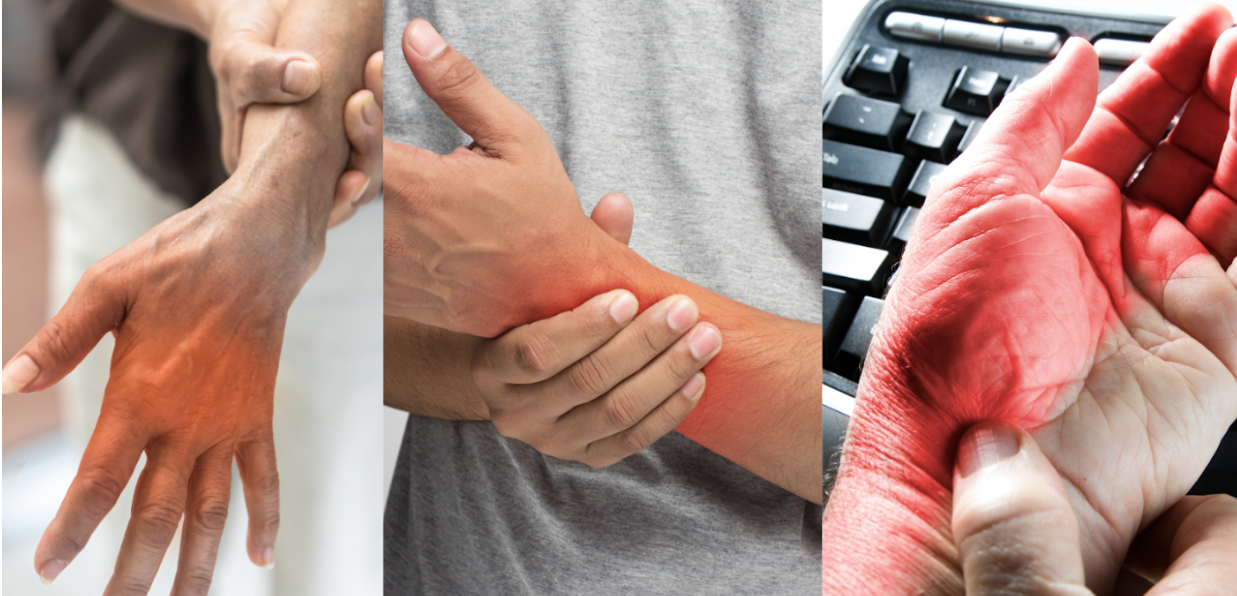
 |
Dr. Kimberly Huynh August 1, 2023 · 6 min |

Carpal tunnel syndrome (CTS) is a very common condition that causes numbness, tingling, or weakening of the hand. It’s also sometimes referred to as median nerve compression. Other conditions that can mimic CTS include arthritic conditions, pronator tere syndrome, thoracic outlet syndrome, or C6-C7 radiculopathy.

Carpal Tunnel Syndrome can be caused by a variety of reasons and may be caused by a combination of factors. Risk factors for developing CTS include being female (smaller carpal tunnel in comparison to men), obesity, repetitive usage of the wrist/hand, and certain jobs such as using vibrating tools in construction.
Other risk factors include diabetes, pregnancy, excess caffeine, nicotine, hypothyroidism, and trauma such as a fracture, laceration, or dislocation.

There are several signs and symptoms associated with carpal tunnel syndrome that may be experienced. Individuals may experience a few if not all listed.
• Tingling in hands and arms
• Numbness in fingers, especially in first four fingers
• Swelling in the wrist and hands may be seen with thenar eminence (thumb pad) atrophy observed in advanced cases
• Local pain and tenderness over inner wrist
• Decrease in grip strength
Individuals may have their hands “falling asleep,” and/or may have trouble holding things (dropping objects). If you experience any of these signs and symptoms, seek help from a health professional so that you can get relief.
Here are a few simple tips that can be incorporated to your daily routine to reduce the stress on your hands:
• Maintain a neutral wrist position while working, typing, or using a computer
• Avoid excessive bending or extension of the wrist for prolonged times
• Allow for adequate rest
• Minimizing repetitive hand and wrist movements
• Exercise regularly to improve blood circulation and reduce inflammation
• Avoid holding objects for a long time (i.e. cellphone)
• Reduce intake of caffeine and alcohol

Chiropractic treatment can potentially help with carpal tunnel syndrome through a variety of approaches. Not only do chiropractors treat the health of the spine, they may also address other areas of the body that could be contributing to or exacerbating CTS symptoms. Here are some ways in which chiropractic care may assist in the management of CTS:
1. Spinal alignment: Chiropractors assess the alignment of the spine and correct any misalignments or subluxations that may impact nerve function. Since the nerves in the neck and upper back can affect the upper extremities, including the hands and wrists, optimizing spinal alignment may help alleviate symptoms associated with CTS.
2. Wrist and hand adjustments: Chiropractors may use gentle adjustments or mobilization techniques to enhance joint function in the wrist and hand. These adjustments aim to restore proper alignment, reduce inflammation, and relieve pressure on the median nerve, which is the primary nerve affected in carpal tunnel syndrome.
3. Soft tissue therapy: Chiropractors may employ various soft tissue techniques like massage, myofascial release, and trigger point therapy to reduce muscular tension and address adhesions or scar tissue in the forearm, wrist, and hand. This approach can improve blood circulation, reduce swelling, and alleviate pressure on the median nerve.

4. Stretching and strengthening exercises: Chiropractors may prescribe specific exercises to stretch and strengthen the muscles surrounding the affected area. Strengthening the muscles in the forearm, hand, and fingers can help support the wrist joint, alleviate stress on the median nerve, and improve overall function.
5. Ergonomic advice: Chiropractors often provide guidance on ergonomics and proper workplace setup to minimize repetitive stress and strain on the wrists and hands. They may suggest modifications to posture, workstation ergonomics, and recommend regular breaks or exercises to reduce the risk of CTS or manage existing symptoms.
6. Lifestyle and nutritional advice: Chiropractors may offer recommendations regarding lifestyle modifications, such as stress management techniques and maintaining a healthy weight. They may also provide guidance on dietary choices that support joint and nerve health.
It is advisable to consult with a healthcare professional for an accurate diagnosis and personalized treatment approach. At Paradise Chiropractic Health & Wellness clinic, our experienced practitioners can treat your hand and wrist concerns effectively, and in addition give you at-home advice for better self-management. Wrist braces to hand exercisers, we can recommend a product that best fits you. For a complimentary consultation or any other inquiries give us a call at (604) 496-0626, email at info@paradisechiropractic.ca, or book online at https://paradisechiropractic.janeapp.com.